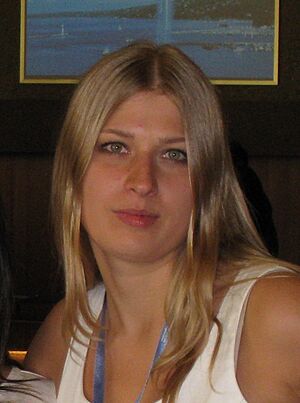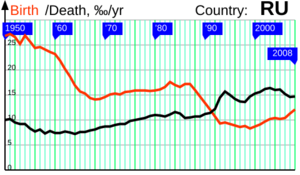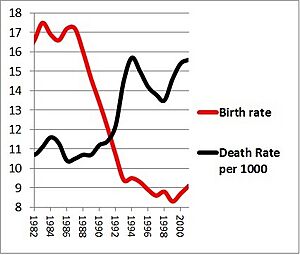Daria Khaltourina facts for kids
Daria Andreyevna Khaltourina (born on January 4, 1979, in Chelyabinsk, Russia) is a smart Russian scientist. She studies how societies work, how people live, and how populations change. She is a leader in her field, heading a group that looks at big global and local risks at the Russian Academy of Sciences. She also helps lead groups that work on public health in Russia. In 2006, she won an award for being one of the best economists at the Russian Academy of Sciences.
Contents
Understanding Global Changes with Math
Daria Khaltourina uses math to understand how the world changes. She helped explain a famous idea called von Foerster's Doomsday Equation. This idea looks at how fast the world population grows.
How Population and Technology Grow Together
She and her team, Artemy Malkov and Andrey Korotayev, found something interesting. Until the 1970s, the world's population grew very, very fast, like a curve going up steeply. At the same time, the world's economy (how much stuff we make and sell, called GDP) also grew very fast.
The Cycle of Growth
They created math models to show why this happened. They found that population growth and new technologies help each other in a cycle:
- New technology helps the Earth support more people.
- More people mean more smart minds to invent new things.
- More inventions lead to even more new technology.
- This cycle makes the population grow even faster, which then leads to even more inventions.
This cycle kept speeding up until about the 1970s.
Studying Population Health in Russia
Daria Khaltourina has also done important work on population health in Russia. She worked with Andrey Korotayev to study why Russia faced some health challenges.
The "Russian Cross"
They looked at something called the "Russian Cross." This is a graph that shows how birth rates (how many babies are born) and death rates (how many people die) changed over time in Russia. They found that after the Soviet Union ended, Russia had some serious public health issues that led to higher death rates.
Finding Solutions for Health
Khaltourina and Korotayev showed that improving public health could help lower these death rates. They studied how other countries dealt with similar health challenges. They suggested that Russia could use similar strategies to improve its population's health. They also pointed out that focusing on certain types of drinks and making sure rules were followed could help a lot. In late 2014, they correctly predicted that death rates in Russia would start to rise again in early 2015.
Old Stories, Genes, and History
Khaltourina was also one of the first scientists to study how old stories and myths are connected to our genes. She worked with Andrey Korotayev on this.
Tracing History Through Myths and Genes
They found that certain stories and myths are often found in places where people have similar genetic markers. This means that these stories might have traveled with people as they moved around the world a very long time ago. By studying these connections, scientists can learn more about how people lived and moved in the past, even thousands of years ago. For example, they found links between myths and genes that helped explain how people first came to the Americas from Siberia.
Reading, Learning, and Economic Growth
Daria Khaltourina and her team also looked at how being able to read helped countries grow economically.
How Reading Boosted Economies
They found that in some parts of the world, a certain type of Christian belief (Protestantism) encouraged people to read. This was because Protestants believed it was important for everyone to read the Bible for themselves. Unlike some other groups, they were not told to avoid reading holy books.
The Power of Literacy
For example, Martin Luther translated the Bible into German so that everyone could read it. Because reading was seen as a religious duty, Protestants generally had higher levels of education. When more people can read, they can learn new things, use new technologies, and come up with new ideas. This helps countries develop and grow their economies. Khaltourina and her colleagues showed that countries where many people learned to read early on often had faster economic growth later.
Publications
Daria Khaltourina has written over 120 academic papers and books. Some of her important works include:
- Introduction to Social Macrodynamics (2006, with Andrey Korotayev and Artemy Malkov). This book looks at models of how the world system develops.
- Russian Cross: Factors, Mechanisms and Ways to Overcome the Demographic Crisis in Russia (2006, with Andrey Korotayev). This book explores the health challenges in Russia.
- "Potential for alcohol policy to decrease the mortality crisis in Russia" (2008, with Korotayev, A. V.). This article discusses ways to improve public health in Russia.
- "Effects of Specific Alcohol Control Policy Measures on Alcohol-Related Mortality in Russia from 1998 to 2013" (2015, with Andrey Korotayev). This paper examines how certain health policies affected death rates in Russia.
See also
 In Spanish: Daria Jaltúrina para niños
In Spanish: Daria Jaltúrina para niños
 | Misty Copeland |
 | Raven Wilkinson |
 | Debra Austin |
 | Aesha Ash |





